Author: Rafael Orellana
Inauguration of the renovated Quri store at the Quito airport

The Quito airport celebrated the opening of the renovated Quri store in its international commercial corridor. Quri, whose name means ‘treasure’ in Quechua, has reinvented its store concept to offer travelers a tangible and unforgettable experience.
With a renewed design conceived by the company that owns the brand, Travel Stores, Quri provides a welcoming atmosphere and invites visitors to explore and delight in the cultural richness, reflected in a wide range of products ranging from crafts to clothing with native designs. In addition, it offers a selection of foods that includes chocolates and coffees.
The opening ceremony was attended by collaborators from Corporación Quiport, Travel Stores, Metropolitan Public Airport Services Company and of course the passengers.

During the event, Francisco Dalmau, CEO of Travel Stores, highlighted the importance of the project, mentioning that it has been a significant challenge. Dalmau pointed out that the store represents a lot for the entire team and that they offer valuable artisanal treasures made by Ecuadorian hands, after having traveled the country in search of the most emblematic products. He also expressed his pride in having materialized the store with such love.
For his part, Ramón Miró, president and CEO of Quiport, expressed his enthusiasm for the opening of the renovated Quri location, highlighting his role as an icon of the Mariscal Sucre. “Quri is the perfect place to promote a sense of belonging and to invite our passengers to rediscover the cultural wealth of Ecuador and its most emblematic products,” he said.
With this renovation, Quri is positioned as an attractive stop for travelers who want to purchase emblematic products from Ecuador before their trip. The store not only adds a touch of local authenticity to the terminal, but also offers an unforgettable experience for all its visitors.
New Courtyard hotel by Marriott Quito will be built at the Mariscal Sucre International Airport

Quiport and Grupo SIXSTAR Hotels are pleased to announce the construction of the new Courtyard hotel by Marriott Quito at the Mariscal Sucre airport. This innovative project responds to an initiative by Quiport to improve airport services and meet the current demand of users and passengers at the capital’s airport, a vision to which the SIXSTAR Hotels Group joined in alliance with Marriott International to execute the construction and administration of the new hotel.
Located on three floors of a mixed-use building in front of the passenger terminal of Quito’s Mariscal Sucre International Airport, this project will offer a first-class hotel experience to users and passengers arriving or departing from the air terminal. Additionally, its location will provide convenient pedestrian access to Ecuador’s busiest airport, significantly improving guests travel experience.
The hotel will have 84 rooms equipped within the brand’s standards. In addition, it will offer additional services such as a gym, business center, meeting room and a grab and go market, meeting the brand’s quality standards.
The total investment by SIXSTAR Hotels for the construction of the Courtyard by Marriott Quito will be 5 million dollars and will generate 60 new jobs in the country. Construction will begin as soon as the respective permits are obtained, with a tentative start date for operations at the end of the first half of 2025.
The project received support from the Ministry of Tourism, the Ministry of Production, Foreign Trade, Investment and Fisheries, as well as the Municipality of Quito, entities that recognize its importance in strengthening the tourist infrastructure and economic development of the city and the country.
“We are very pleased with the announcement that the renowned Courtyard by Marriott brand will have a hotel at the Mariscal Sucre Airport in Quito. This partnership marks a significant moment in our continued commitment to providing world-class services and enhancing our travelers’ experience,” said Ramón Miró, president and CEO of Corporación Quiport. «The Courtyard by Marriott hotel will not only add comfort and convenience for travelers passing through our airport, but will also contribute to the economic and tourism development of our region. We are delighted to welcome this prestigious brand to our airport community. “We are confident that this alliance will further strengthen our position as one of the leading airports in the region.”
“This new hotel development is a great event in the growth strategy of Grupo SIXSTAR Hotels, it’s not only our second hotel developed together with a great partner such as Corporación Quiport at the Mariscal Sucre Airport in Quito, but it is also our first hotel under a Marriott brand about which we are eager to learn more and offer unique experiences to our future guests,” commented Andrés Pachano, executive director of Grupo SIXSTAR Hotels. “We are confident that this partnership with Marriott is perfect for a new development like this.”
This new development promises to raise the standard of hospitality at Mariscal Sucre Airport. Quiport and SIXSTAR Hotels look forward to welcoming visitors to this exciting new addition to the airport landscape.
Rescheduling of flights at Quito airport on May 18th due to preventive maintenance work
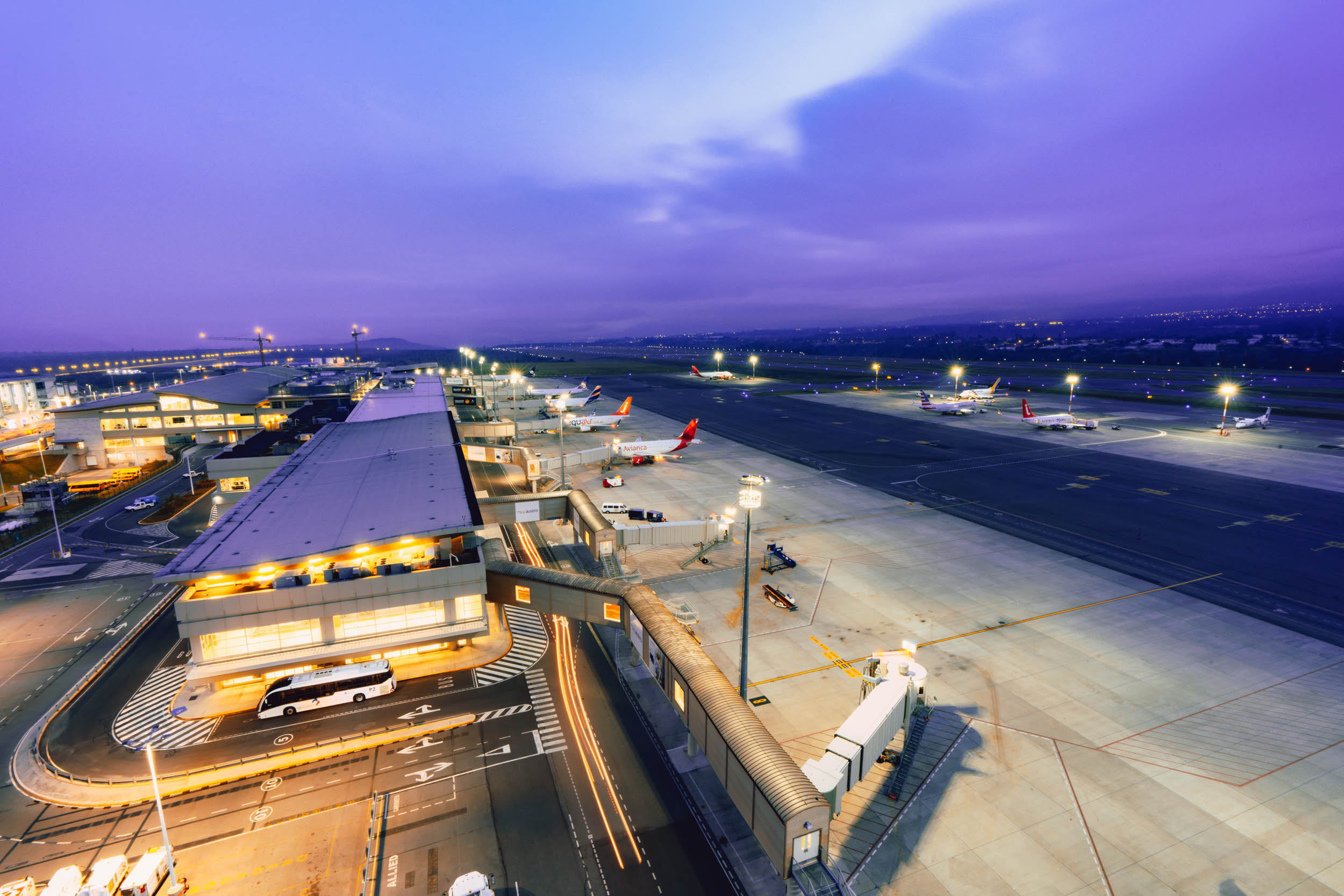
Corporación Quiport reports the list of rescheduled flights for Saturday, 18th, date on which the closure of air operations will take place to carry out preventive maintenance work on the airport runway. Air operations will be closed from 02:00 to 12:00. The passenger terminal will remain open permanently.
It should be noted that the list is prepared based on the information provided by the airlines. For more information, we ask passengers to contact their airline directly.


According to the information published on March 18th, 2024, air operations at Mariscal Sucre airport will be suspended on the following dates and times:
May 11th and 18th, June 1st, July 6th, 13th and 20th, September 7th, 14th and 21stfrom 2:00 a.m. to 12:00 p.m.
June 8th, 15th, 22nd and 29th from 2:00 a.m. to 1:00 p.m.
Preventive maintenance work is necessary to guarantee efficiency and safety in air operations at Quito airport and avoid unforeseen closures due to emergency corrective work.
The aerodrome closures have been coordinated and authorized by the General Directorate of Civil Aviation. The airlines that operate at the Quito airport were duly informed by Quiport and the DGAC through the respective NOTAM.
Quiport inaugurates the first occupational safety and health day for its suppliers and companies at the Quito airport
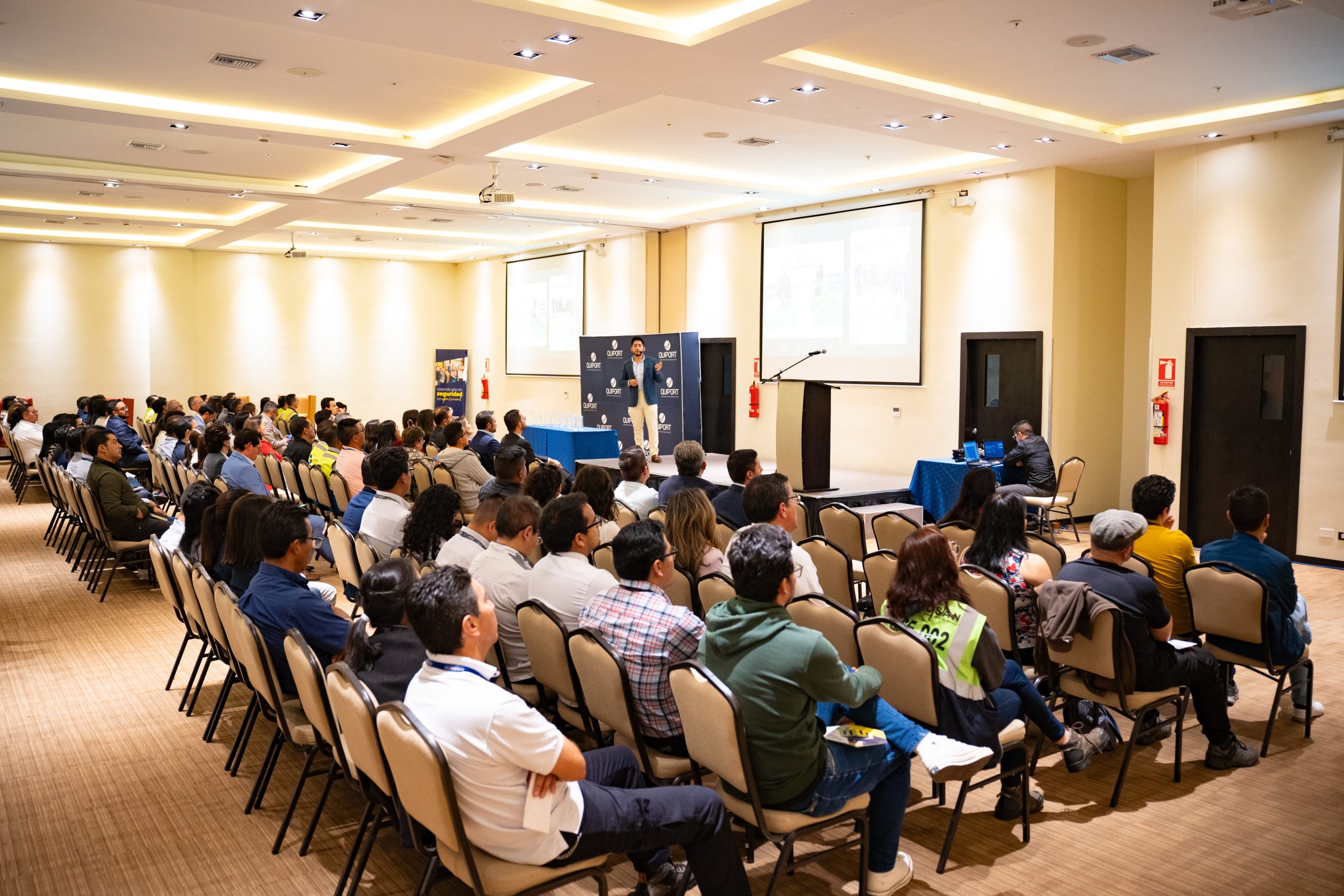
On Friday, April 26, at the Wyndham Hotel, Quiport organized a pioneering event in occupational health and safety aimed at its suppliers and the business community at the Mariscal Sucre International Airport in Quito. The fundamental purpose was to strengthen and promote the importance of safety and health, as well as recognize the outstanding performance of the participants.
Attendees had the opportunity to participate in a keynote lecture by Ismael Echeverría Fernández, leader in Successful Management of the national consulting firm SSO Ecuador.
In addition to attending the event, the OSH company installed several stands to, through a series of games and participatory activities, raise awareness and guide attendees about the importance of safety and health at work.
The event concluded with the presentation of recognition to companies or individuals that stood out in the implementation of occupational health and safety protocols during the years 2022 and 2023. Among the winners were Allied, ENAE, Mera Mex Air, Avianca and Renato Valverde, recognized for their outstanding comprehensive management in occupational health and safety. On the other hand, Talma, EMSA, Urbapark and SFM were distinguished for their performance in categories such as industrial safety, occupational health, labor compliance or continuous improvement.
Ramón Miró, president and CEO of Quiport, highlighted the importance of the event and congratulated all the winners, underlining the Quiport’s continued commitment to the safety and well-being of the collaborators of our commercial operators, contractors and suppliers.
Given the positive response and interest from attendees, Quiport committed to organizing the event annually to continue promoting this crucial topic and foster a collective culture committed to safety and health at work.
Quiport and FONAG, join together in the conservation and protection of water sources

Replenishing water consumption through economic investment in actions that recover and maintain Quito’s water source ecosystems is a commitment celebrated today between Corporación Quiport and the Fund for the Protection of Water, FONAG.
This is the signing of an agreement that allows the execution of the Water Footprint Replacement project, in which Quiport allocates economic resources (USD 42 thousand) that complement the FONAG investment for the execution of conservation actions for water sources in the short and medium term in the wastelands water sources that supply the Quito airport.
What is the water footprint and why do we replace it?
The water footprint is a metric that indicates our direct or indirect consumption of fresh water. In the case of companies, it is used to measure the total volume of water they use in the production of goods or services.
In a first phase, companies must quantify and reduce their water consumption and in a second phase, replenish the remaining water footprint, through activities and projects according to the state of the water source ecosystems from which companies source their supplies.
How will we do it?
The agreement stipulates several actions that will result in the replacement of Quiport’sannual water footprint. In this sense, we highlight the following:
• Reduction of pressures on water source ecosystems: animal load, fires, waste pollution, among others.
• Environmental awareness.
• Involvement and articulation of different actors in conservation and maintenance activities of water source ecosystems.
• Execution of collective activities by Quiport staff such as cleaning and planting for the production of native plants.
• Provision of equipment for control and surveillance personnel.
Ramón Miró, president and CEO of Corporación Quiport, stated: “We are aware of the responsibility that private companies have to protect the ecosystems that are a source of water, in our particular case, the Andean moors located northeast of the city of Quito. The work carried out by FONAG in this area is key to ensuring the provision of water for large areas of the north of the Metropolitan District of Quito and we are pleased to fulfill our commitment by replacing the water footprint of Quiport and the Mariscal Sucre International Airport ”.
For his part, the technical secretary of FONAG, Bert de Bièvre, considers that strategic alliances with companies that supply Quito´s water source ecosystems are vital for their conservation. “All water users have co-responsibility in caring for the sources. Today Quiport joins this effort in a pioneering way, and thus – once again – we put into practice FONAG’s slogan: Together we take care of water sources!
Quito airport obtains Level 4+ ‘Transition’ in the Airport Carbon Accreditation program

• The Mariscal Sucre airport is the first in Latin America and the Caribbean to obtain this level of certification.
• Level 4+ Transition means that Corporación Quiport complies with the compensation of residual carbon emissions while implementing the route towards the decarbonization of airport operations in Quito.
Mariscal Sucre International Airport of Quito has reached a historic milestone by becoming the first airport in Latin America and the Caribbean to receive Level 4+ ‘Transition’ certification in the Carbon Footprint Accreditation Program for Airports, promoted by the Airports Council International (ACI). Thanks to the initiative of Corporación Quiport, the Mariscal Sucre International Airport has been part of this program since 2015.

The Airport Carbon Footprint Accreditation Program (ACA) is an initiative led by ACI that aims to help airports around the world manage and reduce their environmental impact, especially in terms of carbon emissions. This program is based on the evaluation and certification of the actions implemented by airports to reduce their carbon footprint, with different levels of certification that reflect progress and commitment in the matter.
The different levels of certification in the ACA program are as follows:
• Level 1 Mapping: At this level, airports carry out an inventory of their carbon emissions, identifying the main sources of emissions.
• Level 2 Reduction: Airports at this level develop and implement an action plan to reduce their carbon emissions, focusing on concrete measures to improve energy efficiency and reduce fossil fuel consumption.
• Level 3 Optimization: At this level, airports continue to reduce their carbon emissions and work collaboratively with other stakeholders, such as airlines, suppliers and local communities, to promote sustainable practices throughout the supply chain.
• Level 3+ Neutrality: Airports that achieve this level demonstrate that they have fully offset their remaining carbon emissions by purchasing carbon credits or investing in carbon offset projects.
• Level 4 Transformation: Airports at this level have not only achieved carbon neutrality, but have also implemented innovative and strategic measures to further reduce their carbon footprint and promote long-term sustainable practices.
• Level 4+ Transition: airports achieve this level by offsetting residual emissions with reliable counterparts.
• Level 5: This is the highest level of certification in the ACA program. Airports maintain a net zero balance on Scope 1 and 2 emissions and actively address Scope 3 emissions, strengthen the third-party engagement approach and offset residual emissions.
This is the path towards neutrality and decarbonization of operations undertaken by Quiport and Quito airport: level 1 Mapping was obtained in 2015, level 2 Reduction was obtained in 2017, level 3 Optimization in 2018, level 3+ Neutrality in 2019, certification that was renewed in 2021 and 2022. In 2023 Quiport applied to the airport directly to level 4+ Transition, after having completed the activities for level 4 Transformation – which consist of tracing the route towards the decarbonization of its operations by 2035 – and compensate residual emissions through carbon credits from certified projects, a requirement for level 4+ Transition.
These actions reflect the commitment of Quiport and the Quito airport to environmental sustainability and their leadership in the implementation of measures to reduce carbon emissions and promote more eco-efficient air transport.
This distinction positions Mariscal Sucre Airport as an international benchmark in the fight against climate change and sets a high standard for other airports in Latin America and the Caribbean.
Corporación Quiport and the entire airport community are proud of this achievement and reaffirm their commitment to continue working towards a more sustainable and resilient future for future generations.
Roland opens its doors at Quito airport
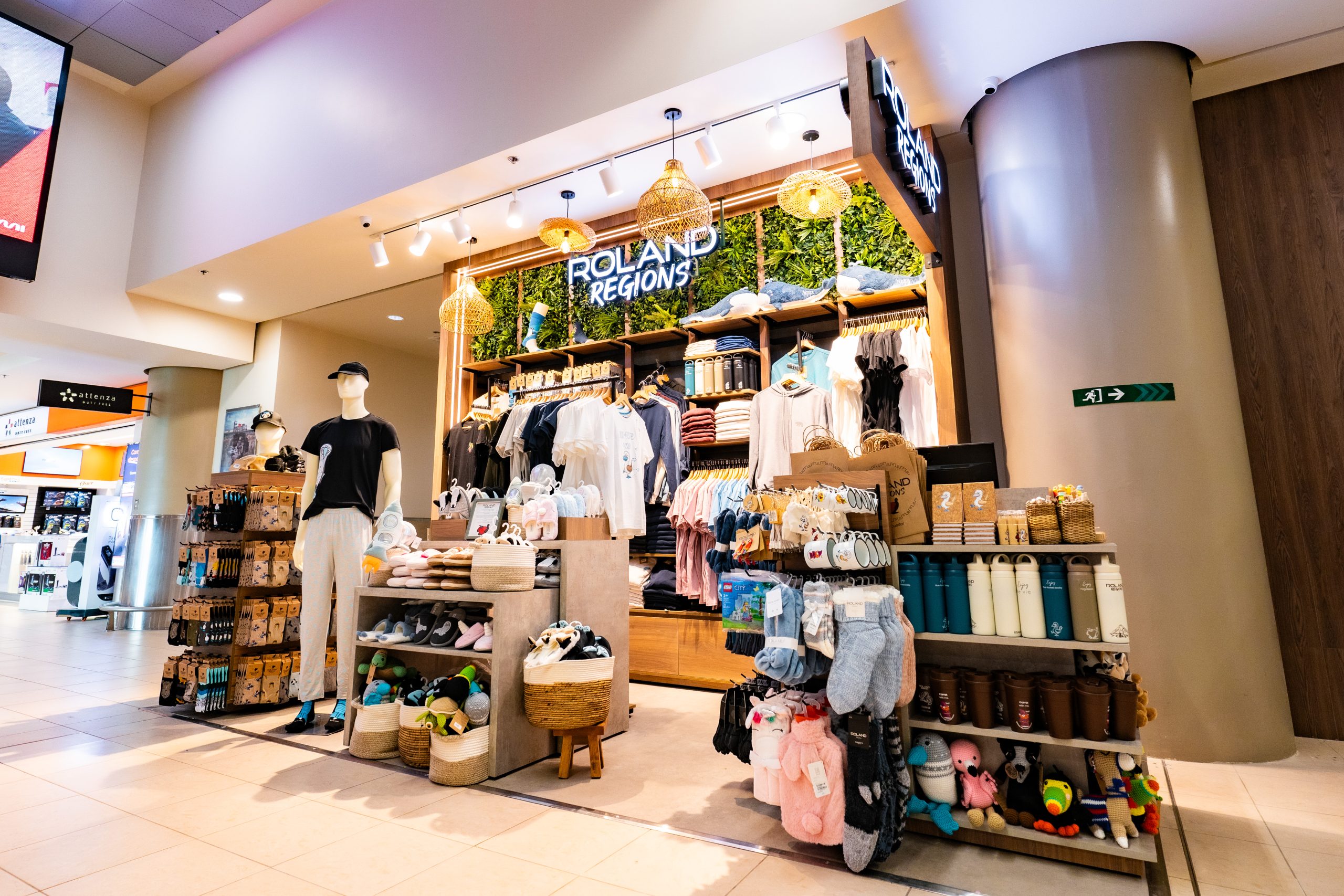
Two Roland commercial islands located in the domestic and international commercial corridor of the Quito airport were inaugurated today with a special event. These new spaces will offer passengers a range of products ranging from pajamas and underwear to t-shirts, stuffed animals and accessories, aimed at men, women, boys and girls.
The opening ceremony was attended by authorities from Roland, Metropolitan Public Company of Airport Services and Corporación Quiport.

Ramón Miró, president and CEO of Quiport, shared his enthusiasm regarding this new addition: «The airport is not just a place of transit, it is a window to the world, a meeting point of cultures, ideas and people. And it is at this neuralgic point where Roland wants to be present to accompany our travelers every step of their journey. Whether they are setting off on an exciting adventure or returning home with stories to tell, we know that at Roland they will not only find garments of the highest quality, but also a reflection of the Ecuadorian identity and spirit.”
For his part, Munir Abedrabo, executive president of Mabel Group Holding, representative of Roland, expressed his gratitude for the opportunity to expand its presence to such a strategic location.
With this opening, Quito airport passengers now have the opportunity topurchase quality products while waiting for their flight or making last-minute purchases.
Temporary suspension of operations at the Quito airport due to preventive maintenance work on the runway
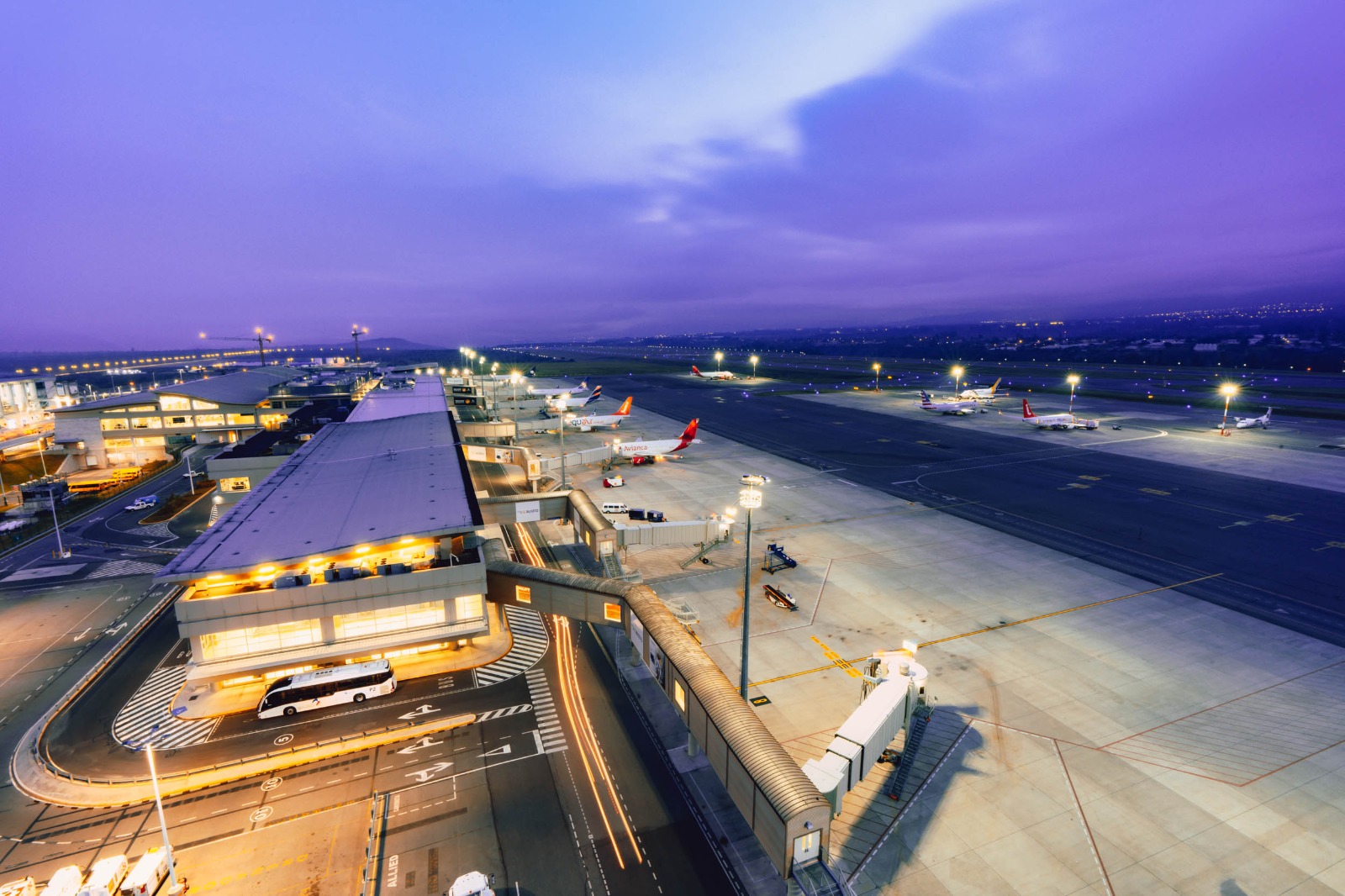
Corporación Quiport, concessionaire of the Quito International Airport, informs about the temporary suspension of air operations at the Mariscal Sucre airport due to preventive maintenance work on the runway.
The maintenance work, which will cover around 70,275 m2 on the runway, ensures efficiency and safeguards safety in air operations, as well as avoiding unexpectedclosures due to emergency corrective work.
The suspension of operations will take place on the following days and times:
– May 11 and 18, June 1, July 6, 13 and 20, September 7, 14 and 21 from 2:00 a.m. to 12:00 p.m.
– June 8, 15, 22 and 29 from 2:00 a.m. to 1:00 p.m.
The aerodrome closures have been coordinated and authorized by the General Directorate of Civil Aviation (DGAC). The airlines that operate at the Quito airport have already been informed of this need by Quiport and the DGAC through the respective NOTAM.
Airlines’ itinerary changes, rescheduling or flight cancellations will be informedopportunely, but we invite passengers who have scheduled flights on those dates and times to contact their airlines to receive updated information. You can find the phone numbers at: https://www.aeropuertoquito.aero/aerolineas/
Quiport will also carry out maintenance work on taxiways A and B, which will not affect air operations, but which, together with the work on the runway, are necessary to keep the airport facilities in optimal condition.
Quito Airport is recognized as the best in Latin America and the Caribbean in the category of 5 to 15 million passengers
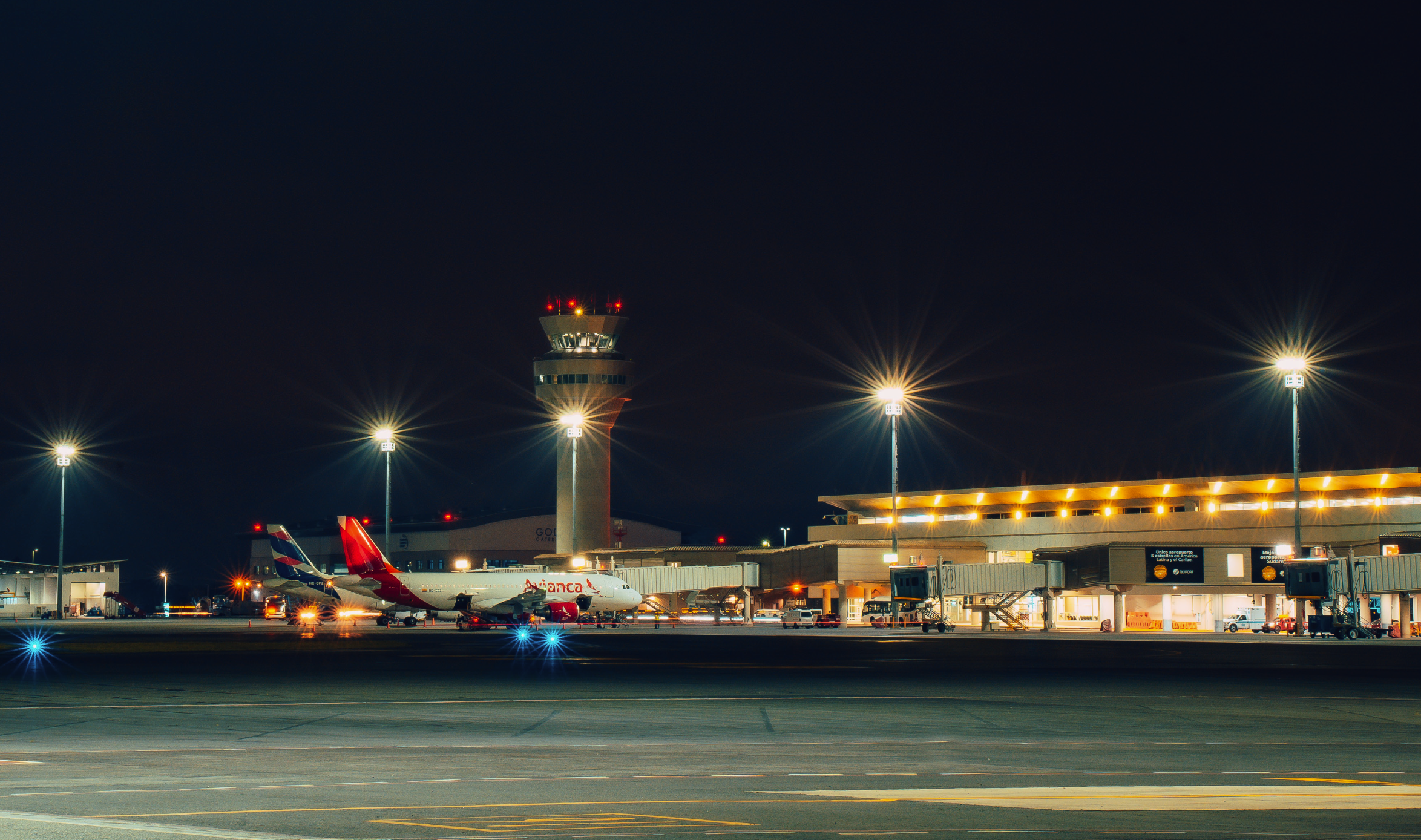
Airports Council International (ACI) World, in partnership with the leading travel technology company, Amadeus, announced the best airports in customer experience around the world, chosen by passengers, through the renowned Airport Service Quality (ASQ) awards, in which the Mariscal Sucre International Airport achieved recognition as the best airport in Latin America and the Caribbean in the category of 5 to 15 million passengers annually and the cleanest airport in the region in the corresponding measurements to 2023.
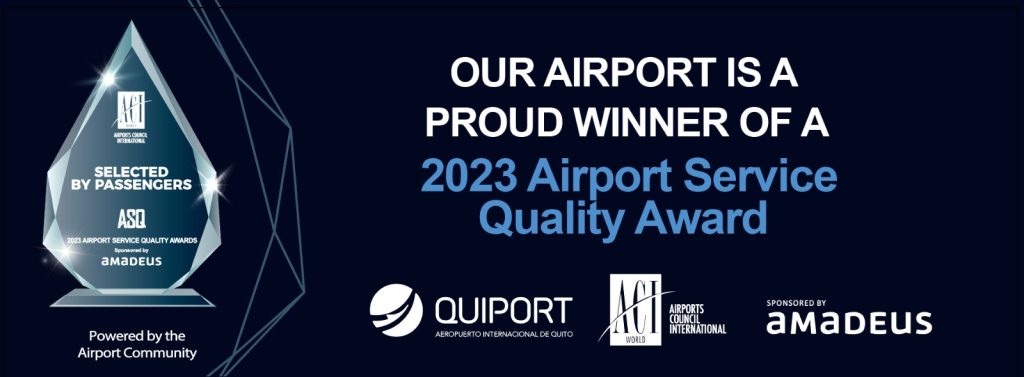
The ASQ program is recognized as the world’s leading airport customer experience benchmarking and measurement program. ASQ’s approach is based on live research conducted through surveys administered directly to travelers at the airport, recording their satisfaction levels on the day of travel. ASQ surveys cover more than 30 performance indicators across key elements of the airport passenger experience, providing the most complete picture of the passenger travel experience.
Ramón Miró, president and CEO of Quiport, the company in charge of the management of the Mariscal Sucre International Airport, said: “These awards are not only a cause for joy for our airport, but they are also important because they reinforce the confidence of passengers in the quality of our services. Additionally, they inspire us to continue innovating, implementing best practicesand continually seeking ways to further raise the standards of excellence in the airport industry. I want to express my sincere gratitude to each member of our team and the airport community, whose effort and dedication have made these achievements possible. These recognitions are a reminder that, together, we can reach the highest peaks and continue to be a benchmark in aviation on a regional and international scale.”
Quiport Corporation has participated in the ASQ program since 2018, which is part of ACI’s passenger experience program in which it currently holds level 5, the highest on the scale, along with Incheon airport in South Korea.
In the measurement carried out between January and December 2023, around 1,400 passengers completed the surveys that are applied to a sample of all flights, destinations and operation hours at the Quito airport.
The survey is made up of 53 questions that cover: satisfaction with each process / service, emotions, process times and passenger profile.
The most notable management areas of the Mariscal Sucre airport are:
–Cleanliness of the terminal, with a rating of 4.47 out of 5.
–Ease of movement within the airport that includes items such as: signage, screening processes, security filters, with a score of 4.33.
–Service vocation of airport staff covering: courtesy and help from all airport staff including airlines, security, immigration, customs, shops and restaurants, with a rating of 4.29.
ACI World General Director, Luis Felipe de Oliveira said: “We are delighted that in 2023 the ASQ program surpassed 400 participating airports in an all-time record, reflecting our members’ commitment to putting the passenger first. We also thank passengers who spent their valuable time providing feedback on nearly 600,000 surveys. The program’s global growth remarks the confidence placed in its live and scientific approach, making ASQ the reference standard for airport customer experience assessment in the aviation industry. The future success of airports depends on an unwavering commitment to delivering a stellar customer experience at every touchpoint. In an era where passenger expectations are quickly evolving, excellence in customer service is not just a goal, it is the key to ensuring that airports remain not just gateways, but memorable destinations in their own right.”
Airports Council International (ACI), the trade association of the world’s airports, is a federated organization comprising ACI World, ACI Africa, ACI Asia-Pacific and Middle East, ACI Europe, ACI Latin America and the Caribbean and ACI North America . By representing the best interests of airports during key phases of policy development, ACI makes a significant contribution to ensuring a global air transportation system that is safe, efficientand environmentally sustainable. As of January 2024, ACI represents 757 members operating 2,109 airports in 191 countries.
JetSMART takes off with its first inaugural flight to Peru
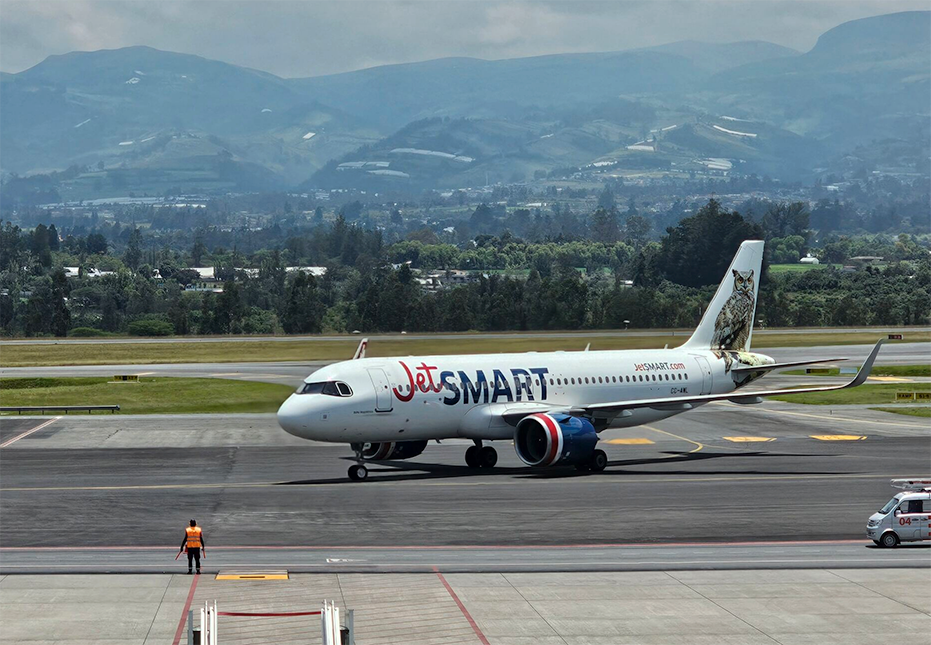
• This March 6, the ultra-low-cost airline that arrived in Ecuador at the end of 2023, begins its operations in the Ecuadorian capital with 3 destinations: Lima, Cuscoand Arequipa.
• The airline expects to transport more than 94 thousand passengers in the first year of operation in Ecuador.
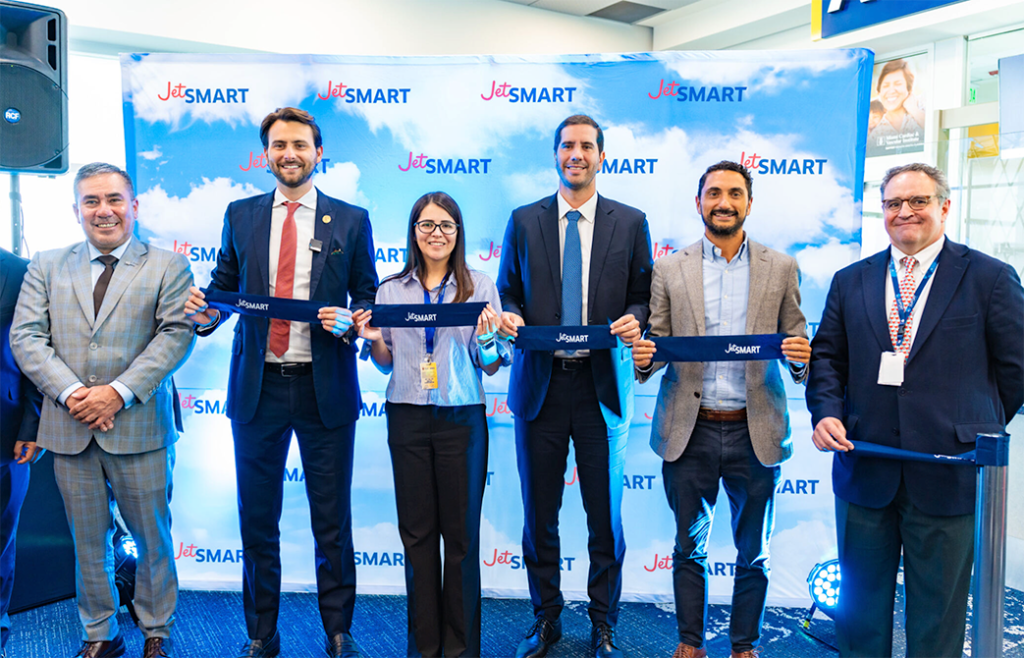
JetSMART, the renowned ultra-low-cost South American airline, started official operations this March 6 from Quito to Lima, Peru, which will allow also to connect to other two cities Cusco and Arequipa. This takeoff marks a significant expansion of the company in the region, being present in 8 countries in the region, seeking to strengthen air connections in South America.
On its inaugural flight to Lima, JetSMART had 98% passenger occupancy, marking its commitment to provide affordable and accessible travel options for Ecuadorian passengers. The routes to Ecuador go from Quito/Guayaquil to Lima and Quito/Guayaquil with a connection in Lima to Cusco and Arequipa. These routes were carefully selected to promote cultural integration between both countries. The objective is not only to unite destinations, but also to promote the exchange of customs and enrich the travel experience of passengers, highlighting the unique characteristics of each place.
During the event, Niels Olsen, Minister of Tourism, said that “we are committed to strengthening the airline sector through various initiatives, which include the reduction of ISD for international airlines and the signing of open skies agreements with several countries. Likewise, in the Urgent Law to Promote Tourism Activities we have proposed benefits such as a progressive reduction of the 5% surcharge on the cost of air fuel. This approach underlines our priority in supporting both the tourism and aviation industries, further promoting air connectivity. We extend a warm welcome to JetSMART to the Ecuadorian skies and wish them great success in their operation.”
Benjamín Dulanto, Commercial Manager of JetSMART Peru, expressed the expectations of starting with this first flight: “For JetSMART, it is essential to promote air connectivity in the region, which enhances bilateral tourism. With fares starting at $25.00 per section plus taxes, JetSMART establishes itself as one of the main low-cost airline alternatives in Ecuador, offering passengers the freedom to pay only for the services they need. This flight marks the beginning of a series of more than 312 flights that we plan to operate during our first year in Ecuador, consolidating our commitment to expansion and accessibility in the Ecuadorian air market.”
For his part, Ramón Miró, president and CEO of Quiport, said “I appreciate and thanksfor the effort and dedication of the entire JetSMART and Quiport teams to make this achievement possible. Air connectivity plays a crucial role in the development of our cities and its contribution to strengthening these relationships is invaluable. I wish to the airline much success in all its current and future operations, particularly this route that we are inaugurating today. I hope this collaboration is productive and benefits both communities.”
Likewise, Gustavo García Benavides, Peru’s Economic and Commercial Advisor in Ecuador, assured that “Ecuador is the third largest source market for international tourists to Peru. Thanks to the start of new air operations to Peru with JetSMART, connectivity will be strengthened, opening greater opportunities for commercial and cultural exchange between our nations. “In this way, the positioning of both countries in the region will be enhanced, generating greater demand in long-haul markets thanks to distinctive elements such as Peruvian products and experiences that include its famous gastronomy.”
JetSMART, recognized as the ultra-low-cost airline with the largest fleet in South America, is also distinguished by its commitment to biodiversity, represented in the distinctive animals that adorn the tails of its planes. Recently, the company was awarded the “World’s Youngest Aircraft Fleet Award” at the “ch-aviation World’s Youngest Aircraft Fleet Awards”, highlighting its fleet of aircraft with an average age of just 3.05 years, which makes it the fifth newest in the world.
